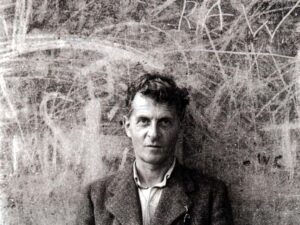Preliminary Plan for the Project.
<Wittgenstein’s Journey: Life & Philosophy>
Michael Lee (The Graduate Center, CUNY)

<Ludwig Wittgenstein, 26 April 1889 ~ 29 April 1951>
Audience:
- The public, especially high school and undergraduate students, who are interested in philosophy and the philosophers behind stories!
Purpose:
- This project is for the DH: Methods and Practices class, and I would like to expand the project into my DH Capstone project.
- Sharing interesting philosophical arguments and clashes related to Wittgenstein’s life and philosophical journey.
Technologies:
- WordPress-CUNY Commons site / Google Maps-OpenStreetMap-Carto-Leaflet JS / Timeline JS
Project Timeline
- 2/14: Simple Idea to be developed.
- 3/1 – Collecting & organizing contents (Wittgenstein’s life, map, stories, events, and his philosophical development)
- 3/15 – Done with all the contents and information.
- 4/1 – Start developing & visualizing the contents on the website at the CUNY Commons site or WordPress.
- 4/15 – Timeline, Mapping, Philosophy arguments!
- 5/1 – Technical Things….
- 5/15 – Fully developed project w/ contents, design, and structure.
- 5/22 – Final Day!
Why Wittgenstein?
First and foremost, Wittgenstein is a great philosopher in the landscape of philosophy from the 20th century to the present. He made significant contributions to various fields of philosophy and those outside philosophy, including logic, the philosophy of language, mind, mathematics, linguistics, cognitive science, and even today’s large language models.
Next, Wittgenstein is an iconic figure in terms of his insightful and admirable philosophical journey, which involves some dramatic adversities, war experiences, close friendships with renowned scholars, harsh debates and clashes, and funny stories.
Usually, we look at Wittgenstein’s philosophical journey as two opposing parts: Early Wittgenstein (Tractatus Logico-Philosophicus) & Late Wittgenstein (Philosophical Investigations and Later Works). However, we can also recognize that these two parts have in common as they are closely related to his personal experience and reflections. Even though Wittgenstein’s philosophical turn from logical analysis of language to everyday use of language produced opposing interpretations and conflicts, such as skeptical and therapeutic approaches to philosophy, no one can deny that this philosophical shift bears abundant fruits in philosophy and other fields.
Through this project, I want to focus on Wittgenstein’s philosophical response to his personal experiences, including his reflections on war, his search for certainty in language, and his engagement with the complexities of everyday language, and share his enthusiastic search for philosophy with the general public (especially high school and undergraduate students, who are interested in philosophy and the philosopher’s life) for their intellectual and philosophical curiosity.
Few DH projects are related to Wittgenstein’s philosophy. Still, they mainly focus on archiving his philosophical works (The Ludwig Wittgenstein Project: https://www.wittgensteinproject.org) or function as a mere academic community for conferences and lectures in philosophy majors. (British Wittgenstein Society: https://www.britishwittgensteinsociety.org/) Unlike existing projects, this project, Wittgenstein’s Journey: Life & Philosophy, offers a philosophical playground for the public by collecting and archiving unique stories, images, pictures, and philosophical remarks about Wittgenstein and building an interactive map concerning his life timeline.
Ex) Wittgenstein had undergone surgery without anesthesia in 1914 when serving as a soldier in the Austro-Hungarian army during WW1. He volunteered to have surgery on a hernia (no use of anesthesia) since Wittgenstein believed that enduring the pain of surgery would help him understand the nature of pain (sensory feeling) and its philosophical relationship to language and consciousness. These were central themes in his philosophical work.
(Kraków Military Command, Field Post Number 186, Poland 1914 from “Frege-Wittgenstein correspondence.”)


